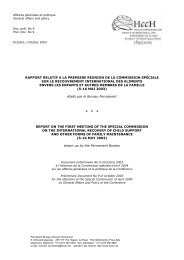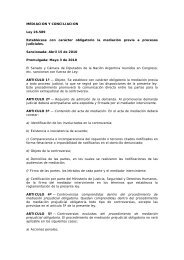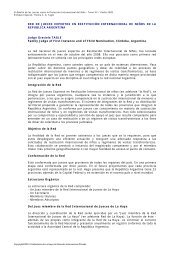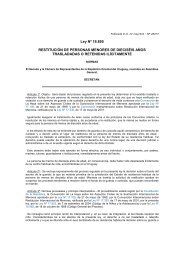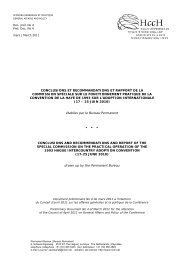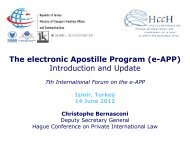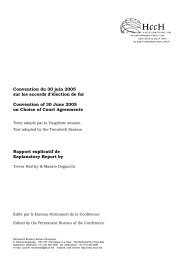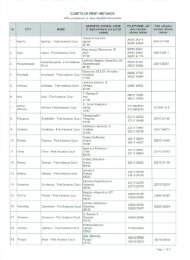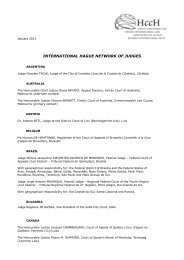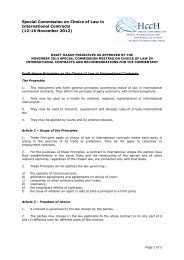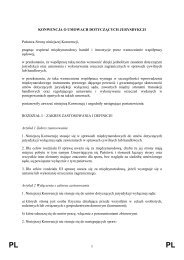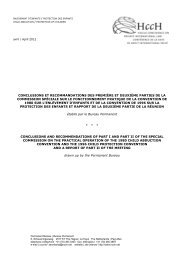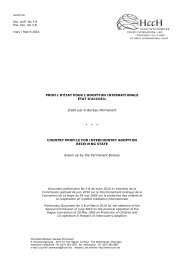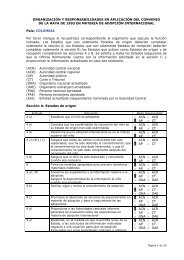conférence de la haye de droit international privé - HCCH
conférence de la haye de droit international privé - HCCH
conférence de la haye de droit international privé - HCCH
Create successful ePaper yourself
Turn your PDF publications into a flip-book with our unique Google optimized e-Paper software.
provi<strong>de</strong>s for the recognition and enforcement of sister state or<strong>de</strong>rs; it establishes rules so that<br />
there is only one outstanding child support or<strong>de</strong>r between the parties; and it establishes rules<br />
among states for establishing and modifying support or<strong>de</strong>rs.<br />
Thus, although it is true that child support is primarily a matter of state <strong>la</strong>w in the United<br />
States, because of both fe<strong>de</strong>ral and state actions much of that <strong>la</strong>w is substantively the same<br />
from state to state. The areas where state <strong>la</strong>ws are not uniform inclu<strong>de</strong>, by way of example,<br />
gui<strong>de</strong>lines (all states must have uniform gui<strong>de</strong>lines that limit the <strong>de</strong>cision maker’s discretion in<br />
<strong>de</strong>termining the amount of a child support or<strong>de</strong>r, but the substance of those gui<strong>de</strong>lines differs<br />
from state to state); the duration of the child support obligation (i.e., when a child ceases to<br />
be a <strong>de</strong>pen<strong>de</strong>nt); and the statute of limitations for enforcing payment of arrears.<br />
Title IV-D and UIFSA have special provisions for <strong>international</strong> cases. In general, if a foreign<br />
country is <strong>de</strong>termined un<strong>de</strong>r either fe<strong>de</strong>ral or state <strong>la</strong>w to be a “reciprocating” country, it is<br />
treated as if it were a state of the United States for purposes of child support enforcement, and<br />
all of the procedures and enforcement mechanisms avai<strong>la</strong>ble un<strong>de</strong>r title IV-D and UIFSA for<br />
interstate cases are avai<strong>la</strong>ble for cases from that foreign country.<br />
The United States is not currently a party to any multi<strong>la</strong>teral convention on maintenance (see<br />
answers to 1999 questionnaire, supra, for exp<strong>la</strong>nation). Therefore, the provisions of title IV-D<br />
and UIFSA are the only mechanisms for the enforcement of foreign child support obligations<br />
through a public agency.<br />
ISRAEL<br />
Introduction<br />
In or<strong>de</strong>r to get a clearer un<strong>de</strong>rstanding of the way in which maintenance obligations works in<br />
Israel, it is first necessary to un<strong>de</strong>rstand a few salient aspects of family <strong>la</strong>w in Israel.<br />
Firstly, a distinction needs to be ma<strong>de</strong> between civil and religious <strong>la</strong>w. There are certain family<br />
<strong>la</strong>w matters, where the religious <strong>la</strong>w is applied as opposed to the civil <strong>la</strong>w. In these cases, the<br />
<strong>la</strong>w of the respective religion a person practices, is the <strong>la</strong>w that will be applied. In other words,<br />
if a person is Jewish, then Jewish <strong>la</strong>w will be applied; if a person is a Muslim, then Is<strong>la</strong>mic <strong>la</strong>w<br />
will be applied, and so on. This is what hereinafter will be referred to as the ‘personal <strong>la</strong>w’. If a<br />
person does not have a personal <strong>la</strong>w, then civil <strong>la</strong>w makes provisions for those circumstances<br />
such as in the Family Law Amendment (Maintenance) Act 1959 (hereinafter - the Maintenance<br />
Act).<br />
Another principle which needs to be un<strong>de</strong>rstood is that of the court’s jurisdiction. The civil and<br />
religious courts have parallel jurisdiction in most family <strong>la</strong>w matters, and the court in which the<br />
matter is heard, is <strong>de</strong>pendant firstly on the parties’ choice and secondly the court before which<br />
the matter was first brought. If a matter calls for the personal <strong>la</strong>w to be applied, it will be<br />
applied even if the matter is heard in a civil court. It should be noted, however, that only a<br />
religious court can grant the actual <strong>de</strong>cree of divorce, but any matters inci<strong>de</strong>ntal to the<br />
divorce, such as custody and maintenance, can be heard by either a civil or religious court.<br />
8



